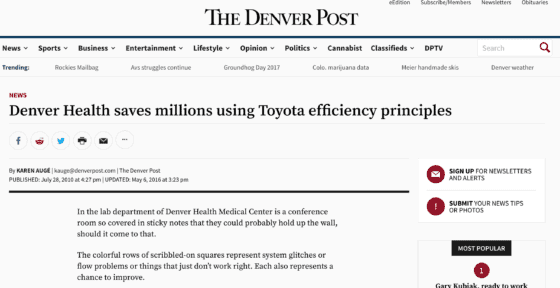It's nice to see examples of Lean Healthcare success in the news, this time on the front page of the Denver Post — “Denver Health saves millions using Toyota efficiency principles.”
As the city health system, they are both an example of Lean Healthcare and Lean Government, saving the taxpayers money and providing better care, to the tune of cost savings of $54 million over the past five years. I was a guest faculty member on Wednesday for an IHI workshop called “$10 Million in Savings – Reducing Hospital Operating Expenses While Improving Quality.” $10 million — congrats, Denver Health — times five.
Early in the article is a great quote that speaks to those who would fear that Lean is nothing but a new way to drive layoffs:
Without those savings, Denver Health would “absolutely” have had to cut jobs, said its chief executive, Dr. Patricia Gabow.
Reducing waste and providing more value to patients is FAR better than the typical alternative – what some at the IHI event called “mindless slash-and-burn cost cutting.” It doesn't take too much creativity to cut services and fire people. Eliminating waste, through Lean, is a far better alternative (and that was the type of thing that was being discussed with the IHI group).
How much waste is there in healthcare?
“They know they've got to cut costs,” said Dr. James Levett, a cardiac surgeon and past chairman of the American Society for Quality's health care division.
“In general, I would say we believe there is probably 20 percent to 40 percent waste in health care,” he said. “And if you want to get rid of waste, that's the key focus of Lean.”
Dr. Gabow, Dr. John Toussaint, and Dr. Don Berwick have been quoted and cited as saying that up to 50% of healthcare activity is “waste.” Remember, reducing waste is not the same as “just doing less” or rationing care. As a nation, we could afford much more care if we could eliminate waste.
The article highlights a number of specific improvements in:
- Ordering inhalers
- Laboratory
- Emergency department
- Maintenance
In the central maintenance area:
In 2009, the engineering department spent $613,651 less on repair and maintenance and supplies than in the pre- Lean high year of 2005.
The article references the work done by employees and leaders in “Rapid Improvement Events” (aka Kaizen Events). Denver Health has seven full-time employees dedicated to Lean (ThedaCare, for example has many times that many).
To those who think Lean is a top-down command-and-control approach, read this:
Levett said one of the reasons Lean is so often successful is that it's not management telling the staff how to improve – it's the other way around.
The article ends reemphasizing the point about layoffs and the importance of “Respect for People:”
While layoffs seem to have become the most convenient cost-cutting strategy rather than a last resort, Lean is an antidote to that approach.
Last year, Denver Health provided but didn't get paid for $360 million in medical care. That's up from $270 million in 2005. At the same time, government aid for the public hospital dropped by $18 million, chief financial officer Burnette said.
Still, Denver Health didn't lay off a single employee.
It's all part of the core of Lean, Gabow said.
“It's about respecting people and their value,” she said.
Thanks to Denver Health for sharing their story with the world – hopefully this will inspire more positive change in the healthcare world.
What do you think? Please scroll down (or click) to post a comment. Or please share the post with your thoughts on LinkedIn – and follow me or connect with me there.
Did you like this post? Make sure you don't miss a post or podcast — Subscribe to get notified about posts via email daily or weekly.
Check out my latest book, The Mistakes That Make Us: Cultivating a Culture of Learning and Innovation:











Just based on casual observation – no data to really back this up – but it appears that the most successful lean transformations are driven by CEOs who are MDs. Kaplan, Toussaint, Gabow… I’m sure there are more. Any speculation as to why? My guess is that having been active players in healthcare delivery processes gives them a firsthand appreciation for the power of Lean.
Your thoughts?
Great question – You know, I had that same conversation with some folks at an IHI workshop this week. That would be an interesting piece of research to do. I know some non-MD CEOs who have been effective with lean also, so there are exceptions to what seems to be a rule of sorts. It probably has to do more with other factors, like personality type and the level of respect they have from different stakeholder groups.
One other thing I forgot to put in my post about the article — it’s too bad the headline focused only on “efficiency” as quality is an equal component of Lean and that’s a major opportunity for Lean in healthcare. It’s not just about cost, productivity, efficiency, etc.
[…] a long-time hospital person who has learned Lean. Experts (doctors) ranging from John Toussaint to Patricia Gabow to Don Berwick all estimate that between 30 to 50% of healthcare spending is […]
[…] a long-time hospital person who has learned Lean. Experts (doctors) ranging from John Toussaint to Patricia Gabow to Don Berwick all estimate that between 30 to 50% of healthcare spending is […]
[…] Dr. Patty Gabow […]